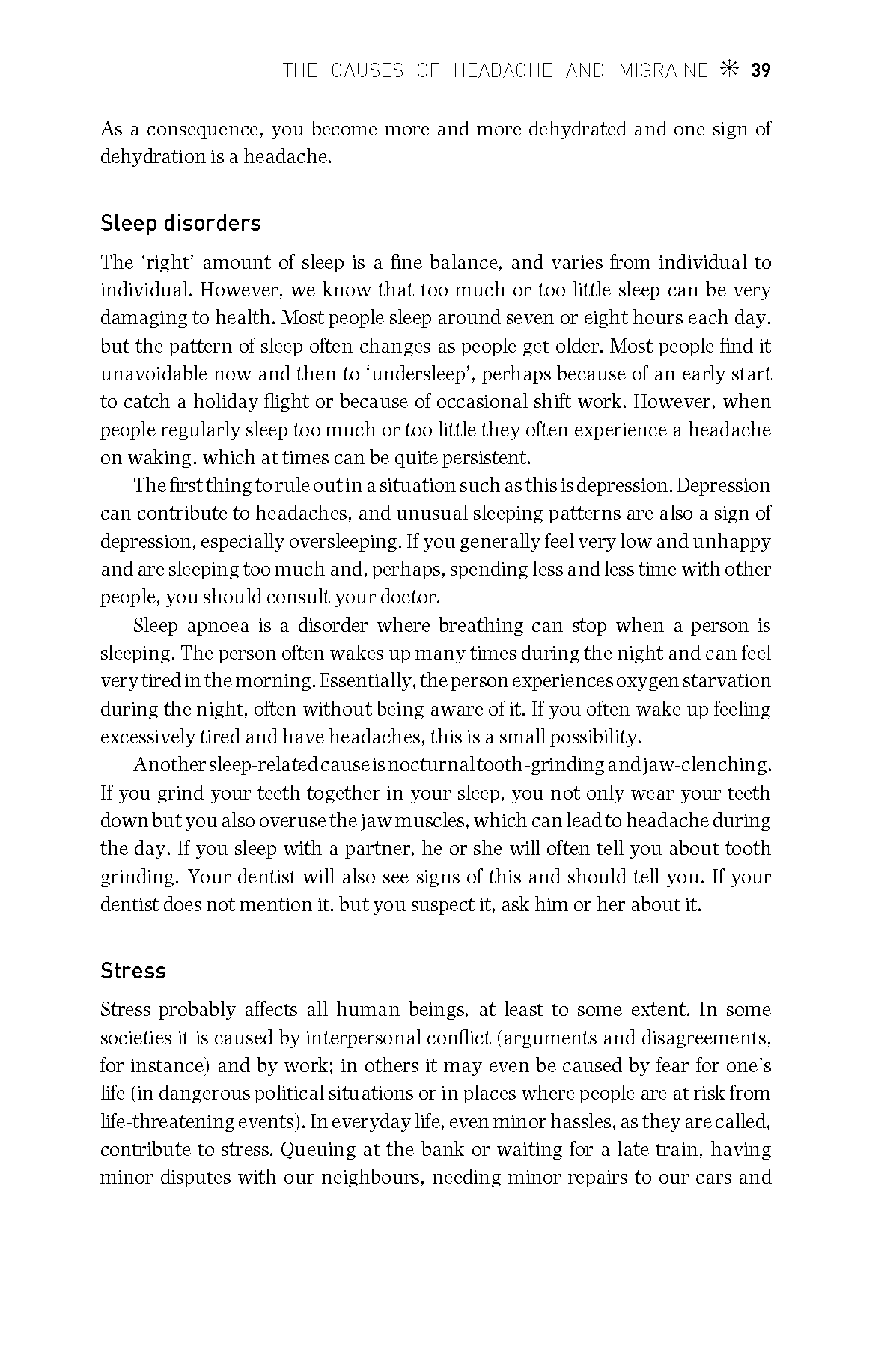UHAM056

THE CAUSES OF HEADACHE AND MIGRAINE ^ 39
As a conseąuence, you become morę and morę dehydrated and one sign of dehydration is a headache.
Sleep disorders
The ‘right’ amount of sleep is a fine balance, and varies from individual to individual. However, we know that too much or too little sleep can be very damaging to health. Most people sleep around seven or eight hours each day, but the pattern of sleep often changes as people get older. Most people hnd it unavoidable now and then to ‘undersleep’, perhaps because of an early start to catch a holiday flight or because of occasional shift work. However, when people regularly sleep too much or too little they often experience a headache on waking, which at times can be ąuite persistent.
The first thing to rule out in a situation such as this is depression. Depression can contribute to headaches, and unusual sleeping patterns are also a sign of depression, especially oversleeping. If you generally feel very Iow and unhappy and are sleeping too much and, perhaps, spending less and less time with other people, you should consult your doctor.
Sleep apnoea is a disorder where breathing can stop when a person is sleeping. The person often wakes up many times during the night and can feel very tired in the morning. Essentially, the person experiences oxy gen star vation during the night, often without being aware of it. If you often wake up feeling excessively tired and have headaches, this is a smali possibility.
Anothersleep-relatedcauseisnocturnaltooth-grindingandjaw-clenching. If you grind your teeth together in your sleep, you not only wear your teeth down but you also overusethe jawmuscles, which can leadto headache during the day. If you sleep with a partner, he or she will often tell you about tooth grinding. Your dentist will also see signs of this and should tell you. If your dentist does not mention it, but you suspect it, ask him or her about it.
Stress
Stress probably affects all human beings, at least to some extent. In some societies it is caused by interpersonal conflict (arguments and disagreements, for instance) and by work; in others it may even be caused by fear for one’s life (in dangerous political situations or in places where people are at risk from life-threatening events). In everyday life, even minor hassles, as they arecalled, contribute to stress. Queuing at the bank or waiting for a late train, having minor disputes with our neighbours, needing minor repairs to our cars and
Wyszukiwarka
Podobne podstrony:
UHAM058 THE CAUSES OF HEADACHE AND MIGRAINE * 41 Torelli, Cologno and Manzoni (1999) investigated we
UHAM054 4The causes of headache and migraineIn this chapter, some of the common and rare causes
UHAM060 THE CAUSES OF HEADACHE AND MIGRAINE ^ U2 wants to make your life worse with painkillers, and
UHAM062 THE CAUSES OF HEADACHE AND MIGRAINE ^ 45 genuinely intense, or if it is accompanied by other
UHAM066 THE CAUSES OF HEADACHE AND MIGRAINE ^ U9 Two of the most common headache-causing foods are c
UHAM068 THE CAUSES OF HEADACHE AND MIGRAINE ^ 51Diabetes Headaches can result from diabetes, because
UHAM070 THE CAUSES OF HEADACHE AND MIGRAINE * 53 HELPFUL TIPSHELPFUL TIPS! HELPFUL TIPS! HELPFUL Tak
UHAM064 THE CAUSES OF HEADACHE AND MIGRAINE ^ Ul However, the best method of avoiding it is consider
UHAM072 THE CAUSES OF HEADACHE AND MIGRAINE ^ 55 something similar, andwemayevenhavehadaheadache aft
UHAM014 About this book In the first chapter, the differences between headaches and migraines are ou
The Causes of Emancipation The whole process of the emancipation of the serfs was a slow one, lastin
Host cache. MySQL now provides morę information about the causes of errors that occur when clients c
UHAM055 38 * UNDERSTANDING HEADACHES AND M IG RAI N ES Stress, food, drink and light are aLL common
więcej podobnych podstron